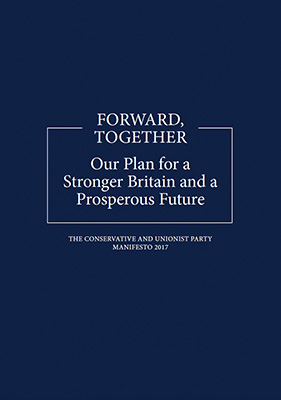Election 2017: Promises, promises
What the Conservative manifesto offered… and what we might get.

Funding
- “Increase NHS spending by a minimum £8bn over the next five years”
It will be hard to back down on one of the few goodies in the manifesto. But experts agree it’s nowhere near enough and the DUP wants up to £1bn to go to the NHS in Northern Ireland.
- “The most ambitious programme of investment in buildings and technology the NHS has ever seen”
It’s not clear where the money’s coming from, but ministers are probably eyeing up the £10bn of potential property sales identified in the Naylor report. How many sell-offs of NHS assets will get past jittery Tory MPs sitting on small majorities remains to be seen.
Workforce
- “Make it a priority… that the 140,000 staff from EU countries can carry on making their vital contribution to our health and care system”
Not exactly a guarantee, but with the balance of opinion in the Commons shifting towards a softer Brexit, there’s a good chance of an early deal.
- “Ensure that the NHS and social care system have the nurses, midwives, doctors, carers and other health professionals that it needs”
A vague (and grammatically-challenged) promise that the Government is unlikely to have time to meet – and certainly not without abandoning its pay cap and investing a lot more than the promised £8bn.
- “We will act to reduce bullying rates in the NHS, which are far too high”
Health minister Philip Dunne made a strong personal commitment to this at last year’s MiP conference. Dunne kept his job, and as this requires neither much money nor legislation, some progress should be possible.
- ”We will introduce a new GP contract… we will reform the contract for hospital consultants”
Highly unlikely. An unstable government won’t want to provoke another damaging dispute with doctors.
- ”We will recruit up to 10,000 more mental health professionals”
There is strong cross-party support for action on mental health, so some movement is possible. Funding and recruitment will prove difficult.
Reform
- “We will legislate to reform and rationalise the current outdated system of professional regulation of healthcare professions”
This has been trailed as a merger of the NMC, the GMC and other professional regulators. It’s hard to see this government having the head space or the legislative time for this. - “We will back the implementation of… Sustainability and Transformation Plans, providing they are clinically led and locally supported”
This could be more of a get-out clause than a commitment to genuine local involvement. Political support for STPs is likely to stay patchy, and significant local opposition could easily kill off unpopular plans. - ”If the current legislative landscape is either slowing implementation of STPs or preventing clear national or local accountability, we will… make the necessary legislative changes”
With no majority and Brexit hogging the timetable, new NHS legislation is highly unlikely during this parliament. The Government may concentrate on promised “non-legislative changes” to limit the operation of the internal market.
For more, read our election analysis or browse the 2017 Conservative manifesto in full.
Related News
-

Professional regulation: still more questions than answers
After the government unveiled a new barring scheme for board-level executives this summer, plans for regulating NHS managers became a little clearer. But many big questions about how the NHS will regulate, support and develop its future leaders remain unanswered. Rhys McKenzie reports.
-

We’re proud of what MiP has done – managers need it more than ever
As MiP reaches its 20th birthday, general secretary Christina McAnea re-affirms UNISON’s commitment to the unique joint venture that has given NHS management a home and a voice.
-

Forget Musk’s slash and burn—this is what real change looks like
How the NHS can do better without more money is the big question the ten year plan needs to answer. Health economist Andi Orlowski argues for making change with consensus rather than a chainsaw — and explains why ‘allocative efficiency’ is our best bet for real reform.